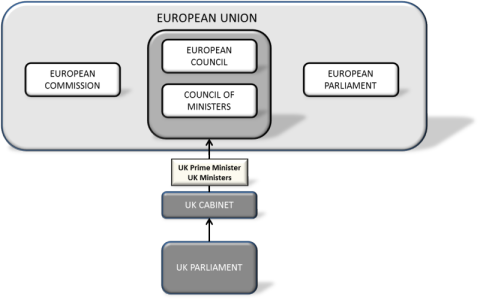A Union Built on Established Principles of Government
This is not a blueprint for untried and untested methods of government; the new Union will be built upon established principles of government. The principal foundations for this blueprint are the frameworks of government already underpinning the European Union (EU). This is a critical element of this blueprint; the rights and responsibilities of government, already established by EU treaties, form the basis of this framework. In particular, the European Council, and its methods of operation, are at the heart of this proposal and form the basis for the proposed Cabinet of the United Kingdom.
The principal elements of the European Union, and how the UK government interacts with them, are illustrated in figure 1. Within this model of government a UK Cabinet is formed from the ruling party, or coalition, in the UK Parliament. Members of the UK Cabinet attend appropriate meetings of the EU Council of Ministers on behalf of the UK Government. The Prime Minister attends European Council meetings. These two bodies combined, the Council of Ministers and the European Council, form the policy making and decision making heart of the EU. The European Parliament, to a certain extent, exercises political supervision over the EU’s activities. The European Commission is the administrative body that manages and runs the European Union.
Key Elements of Government
The roles of the European Council and the Council of Ministers provide key elements for the structures of government proposed in this blueprint for a new Union between England and Scotland.
- The European Council - The Lisbon Treaty refers to the European Council as being an official institution
which "shall provide the Union with the necessary impetus for its development". Essentially, it defines the EU's policy agenda and it achieves this without any formal powers, only the
influence it has being composed of national leaders;
- The Council of Ministers – This is the EU’s main decision-making body. According to the Treaties, the Council has to take its decisions either by a simple majority vote, a qualified majority vote, or unanimously, depending on the subject to be decided. The Council has to agree unanimously on important questions such as amending the Treaties, launching a new common policy, or allowing a new country to join the Union (Europa, 2012a).
It is the combination of power held by these two EU institutions that provides a critical element of the template for government proposed in this blueprint.
Unanimity Will be Critical
The principle of unanimity, established for all decisions on important matters in the EU, will be critical for the success of the new Union between England and Scotland. Although qualified majority voting has gradually been introduced into EU treaties, this system will not be implemented as part of any new Union treaty between England and Scotland. All joint decision making in the new Union will be based on unanimity. The importance of unanimous voting was powerfully demonstrated by David Cameron when he refused to provide UK support for fiscal union in the EU. By doing this he effectively vetoed this idea as formal EU policy. Unanimous voting will ensure that neither nation, England nor Scotland, can be forced into polices that are not in its national interest; this is a fundamental element of an equitable union.



